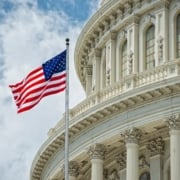FERC Jurisdiction Upheld in Puerto Rican Liquified Natural Gas Terminal Proceeding, New Fortress Energy Inc. v. FERC
On June 14, 2022, the U.S. Court of Appeals for the District of Columbia Circuit upheld the Federal Energy Regulatory Commission (FERC) finding of jurisdiction over New Fortress Energy LLC’s (New Fortress) liquified natural gas (LNG) import terminal facility in San Juan, Puerto Rico, in New Fortress Energy Inc. v. FERC. The jurisdictional question turned on whether a 75-foot pipe transporting regassified LNG from a floating storage unit moored at the San Juan Harbor to the San Juan Power Plant could be deemed a “pipeline” under the Natural Gas Act (NGA). In deference to FERC, the court agreed with the agency’s finding that it could.
The jurisdictional question came before the court on a petition for review of a FERC-initiated show-cause proceeding finding that New Fortress had violated NGA Section 3 by failing to obtain authorization to construct and operate the LNG import facility. New Fortress had argued that FERC’s jurisdictional finding was arbitrary and capricious and an insufficiently explained departure from precedent, which had extended jurisdiction over LNG terminals only to natural gas facilities “that receive or send out gas by pipeline” as opposed to sending out gas by waterborne vessels, trucks, or trains. The court found that FERC’s application of the pipeline requirement to the 75-foot pipe was consistent with precedent, that its orders on review were sufficiently explained, and that FERC had not created a new jurisdictional test simply because the pipeline in question was 75 feet long as opposed to a miles-long transportation system.
New Fortress has a unique fact pattern given that FERC jurisdictional LNG import terminals typically are located adjacent to interstate pipeline networks, which are nonexistent in Puerto Rico. While New Fortress had not filed a formal petition for declaratory order asking FERC to disclaim jurisdiction prior to construction or entering service, it had sought informal advice from FERC staff on the jurisdictional question and had acted, based on that advice, on the assumption that FERC would not assert jurisdiction. New Fortress serves as a reminder that informal staff advice is not binding on the agency. It also is an indication that the D.C. Circuit will continue to defer to FERC when it is interpreting statutory provisions that Congress has charged it with administering, including NGA Section 3.
This post is as of the posting date stated above. Sidley Austin LLP assumes no duty to update this post or post about any subsequent developments having a bearing on this post.



